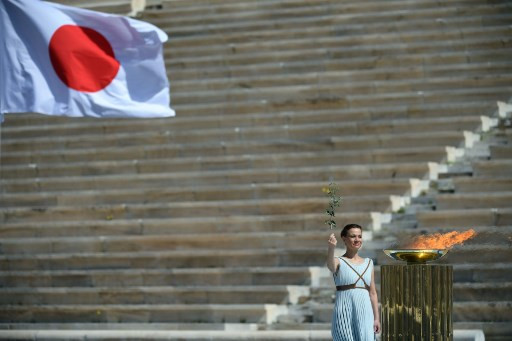Popular Reads
Top Results
Can't find what you're looking for?
View all search resultsPopular Reads
Top Results
Can't find what you're looking for?
View all search resultsWhen the Games went viral: Historic Olympic health scares
Tokyo 2020, which had been due to start on Friday until it was postponed for a year, will not be the first Olympic Games to face a health crisis, although the scale of the challenge posed by COVID-19 is unprecedented.AFP looks at previous Olympics that went ahead in the face of viral outbreaks.
Change text size
Gift Premium Articles
to Anyone
 A perfomer stands next to the Olympic flame during the olympic flame handover ceremony for the 2020 Tokyo Summer Olympics, on March 19, 2020 in Athens. Tokyo 2020, which had been due to start on Friday until it was postponed for a year, will not be the first Olympic Games to face a health crisis, although the scale of the challenge posed by COVID-19 is unprecedented.
(AFP/Aris Messinis)
A perfomer stands next to the Olympic flame during the olympic flame handover ceremony for the 2020 Tokyo Summer Olympics, on March 19, 2020 in Athens. Tokyo 2020, which had been due to start on Friday until it was postponed for a year, will not be the first Olympic Games to face a health crisis, although the scale of the challenge posed by COVID-19 is unprecedented.
(AFP/Aris Messinis)
T
okyo 2020 organizers will this autumn begin the task of devising safety protocols to allow the Games to take place if the coronavirus pandemic is still raging.
But Tokyo 2020, which had been due to start on Friday until it was postponed for a year, will not be the first Olympic Games to face a health crisis, although the scale of the challenge posed by COVID-19 is unprecedented.
AFP looks at previous Olympics that went ahead in the face of viral outbreaks.
Nagano 1998: Flu
There was an outbreak of influenza the last time Japan hosted the Games -- the Winter Olympics in the central city of Nagano in 1998.
Nearly 1,500 schoolchildren in the Nagano region came down with the flu and some 200 people connected with the Games were taken ill -- although officials stressed other illnesses were also to blame.
The virus prevented Norwegian 1,500 meter gold medal-winning speed skater Adne Sondral from going for a double in the 1,000 meters.
German figure skating medal hopeful Tanja Szewczenko pulled out over health fears and the International Olympic Committee (IOC) also got involved, warning competitors against the flu and advising them to take on plenty of fluids.
That outbreak of flu was unrelated to the killer bird flu hitting southern China at the time.
Rio 2016: Zika
Ahead of the 2016 Rio Olympics, the talk was dominated by Zika, a mosquito-borne virus that can cause pregnant women to give birth to babies with microcephaly -- a deformation that results in abnormally small brains and heads.
The Zika outbreak began in 2015 and infected around 1.5 million people, according to the World Health Organization (WHO), mainly in Brazil.
There was concern that international visitors to the Games could spread the virus globally, even though the WHO assessed the risk as "minimal."
Some leading tennis players and golfers -- including golf's current world number one Rory McIlroy -- decided not to compete due to fears over the virus.
The stories proved more dramatic than the facts, with no new cases reported during the Games.
Mexico 1968: Flu
The 1968 Olympics in Mexico took place during one of the worst pandemics of the 20th century -- the Hong Kong Flu.
It spread throughout Asia after emerging in the then British colony neighboring southern China, and had reached the Americas by late 1968, eventually killing around one million people but had little impact on the Games.
Antwerp 1920: Flu
Held in the aftermath of the Spanish Flu, considered to be the most deadly in history and claiming up to 50 million lives, the Antwerp Games were seen as a symbol of humanity's effort to rebuild after the devastation of World War I.
Although the Spanish Flu killed five times more people than died in 1914-18 war, the impact of the virus was overshadowed by the global conflict.
A century on, Tokyo 2020 organizers have been at pains to stress that if the Games go ahead they will again stand as a beacon of triumph against adversity.









